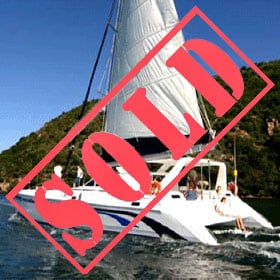 There has been a lot of chatter lately on blogs and forums about yacht brokers and we thought that we should address some of the issues and questions. In this article we hope to clearly articulate the value the consumer/buyer can experience from the broker’s negotiating skills, marketing skills and market knowledge. The purchase of a cruising yacht is probably one of the biggest investments the buyer will make in their lifetime so it makes complete sense to ensure that they have the very best representation.
There has been a lot of chatter lately on blogs and forums about yacht brokers and we thought that we should address some of the issues and questions. In this article we hope to clearly articulate the value the consumer/buyer can experience from the broker’s negotiating skills, marketing skills and market knowledge. The purchase of a cruising yacht is probably one of the biggest investments the buyer will make in their lifetime so it makes complete sense to ensure that they have the very best representation.
Being represented by a professional brokerage house does not add a penny to the yacht purchase price for a buyer. The fee is totally paid for by the seller. Yes, the buyer’s broker is totally free to the buyer. So why not get your own broker to represent your interests when looking to buy a boat? You can have the listing broker represent both you and the seller but consider this: the listing broker’s job is to represent the seller and to get the highest possible price for the yacht, which is not necessarily your objective as the buyer.
That is why it’s best to have your own broker to represent your interests exclusively. When going into a purchase of this magnitude, yacht buyers need to know that they have a team of professionals that are acting entirely in their interests. Find a broker whom you feel comfortable with and trust and have him/her work for you. We have had buyers looking for as long as five years before actually buying (not typical, thankfully). But a good yacht broker will stick with you, educate you, and guide you through the process.
Choose a Yacht Broker Carefully
Before you choose your broker, make sure that you know what you want. Do your research and be realistic about your expectations. Decide what kind of boat will suit your needs, decide on a budget and make a list of the equipment and features on the boat that are most important to you. If you can, charter different boats to help you figure out more or less what is more important to you. For instance, will you give up a “walk around bed” to have a bigger cockpit or would you give up a big chart table to have more storage? These are extreme examples but unless you spend time on a boat, you cannot know what is important to you. Once you have a plan and a budget, it’s time to select your broker. Here are some things to consider:
Licensed & Bonded Broker
Requirements to become a broker is different in every state. Florida, because of the volume of yacht brokerage transactions, is one of the best jurisdictions in which to purchase a vessel. The laws are very favorable and very protective of the buyer. Here are some things that ensure buyers in Florida are protected:
- To become a yacht broker in Florida, one has to do a two-year understudy period under a licensed and bonded broker as a Sales Associate before being able to apply for a Yacht and Ship Brokers License.
- The brokers’ licenses are regulated by the state and require the broker to register with a bond ($25K errors and omissions) which is lodged with the state.
- Brokers are required to renew the license every two years which ensures that the details on record are updated.
- An escrow bank account is also required to be registered with the state and the details are updated at the time of license renewal.
So it’s important that your broker should be registered in the state where he/she operates for legal reasons.
Research the brokerage firm, i.e., their reputation in the industry. The biggest or most well-known brokerages are not always the best brokers. Smaller brokerages may be more personal than the very rigid structure of bigger corporations. Get testimonials from previous clients, interview your broker and make sure that they clearly understand your needs. Make sure that their specialty as a firm gels with what you are looking for. No point going to a dealer for 20ft Bayliner motor yachts when you are looking for a 50ft Bavaria Cruiser sail boat.
Yacht Broker Knowledge
The broker should be able to consult, advise, and educate the buyer on equipment or upgrades and help appoint vendors. Not only does he have to know the product/boat, but should also understand how to use the equipment and explain to a buyer how and why it is good to have certain equipment on board for your specific needs. For instance, a broker who has sailed/cruised and/or lived aboard will be better able to give the advice that a prospective cruiser needs. Weekenders or racers have totally different needs and the buyer should be aware of that.
Negotiating Skills
A good broker will know when to negotiate a little more aggressively and when to pull back. (A good deal is when both parties walk away happy). The seller’s bottom line is not always set in stone, even if they think so. Sellers always think their boats are worth more than it actually is but when you calculate holding costs like insurance, dockage, maintenance, haulout, etc., holding out for an extra $10,000 or $20,000 is not always the wisest decision. There are definite selling and buying seasons when boats will be cheaper i.e. phase-out season in the Caribbean when lots of boats go on sale from the charter fleets all at the same time. This would be the time to negotiate an incredible deal! Boats in certain regions will fetch better prices like boats in fresh water lakes. These boats typically have far less wear and tear because of the shorter seasons and the fresh water. Your broker should be aware of these market nuances.
Market Knowledge
There are currently about 80,000+ yachts listed for sale in the world. Most are in the major databases accessible also to the public, e.g., Yachtworld. However, some of the best deals are often not advertised, like bank repossessions, trade-ins, and boats that must be sold at any cost by a seller in a difficult situation. A professional broker knows where to find those “great deals” through his personal network. Brokers also have access to professional software and can compare and find the history of the real transactions on similar boats. This will give the buyer some perspective of what is out there and what to expect. We can provide photos, layouts, line drawings and spec sheets on any yacht in the world and therefore cut down on wasted trips to visit yachts that are misrepresented, unfortunately a common occurrence.
Yacht Buying Process and Logistics
The buyer’s broker is the person who ensures that all the components of the transaction are covered. The Buyer’s broker will perform the following duties:
- Ensure that the Purchase and Sale agreement as well as all the related documents used to negotiate the purchase are well written and protect all the parties in the transaction.
- Advise the buyer on the time line for acceptance closing etc. When doing a transaction like this the coordination, scheduling and time line is critical as follows:
- Date of the sellers acceptance of offer
- Scheduling the seller, buyer, brokers, surveyor and yard for haul out
- Date of final acceptance
- Date of closing with all related components – documentation, funding, insurance, transfer of possession etc.
- Assist the buyer in arranging the survey, haul-outs and sea trials. We assist in the survey follow up and analyze the survey findings with the buyer. Those findings could further lower the purchase price in a second round of negotiation, a process known as “conditional acceptance”.
- Advise the use of a documentation agent to obtain abstract of title and ensure that there are no liens or encumbrances and that the vessel is free and clear.
- Advise on vessel insurance
- Assist on vessel registration and flagging if it has been flagged offshore
- Assist and advise if the boat needs to be moved from the place of acceptance to the buyers home port
- Consult and advise the buyer on equipment or upgrades and help appoint vendors.
- Remain a friend and valuable resource for the buyer after the transaction has closed and the buyer owns the yacht. A quick disappearance act after the check clears is not the desired result!
Specific to Florida
The broker will check if the boat can be legally sold in Florida ( Duties & Sales Tax paid) Florida broker will assist with the sales taxes, county tax and dinghy taxes, or tax exemption if you are not a Florida resident.
Make sure that your yacht broker knows the product, understands the industry, and can advise on ALL components of the transaction. All boats are not created equal, so if you are not an expert on boat construction, propulsion, sails, mechanics and electronics, get yourself a good broker and appoint an independent surveyor. They will be your best allies in the yacht buying process.





